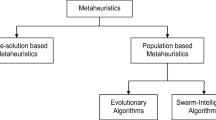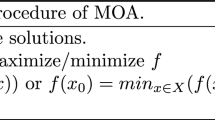Abstract
Evolutionary programming has been widely applied to solve global optimization problems. Its performance is related to both mutation operators and fitness landscapes. In order to make evolutionary programming more efficient, its mutation operator should adapt to fitness landscapes. The paper presents novel hybrid evolutionary programming with adaptive Lévy mutation, in which the shape parameter of Lévy probability distribution adapts to the roughness of local fitness landscapes. Furthermore, a modified Nelder–Mead method is added to evolutionary programming for enhancing its exploitation ability. The proposed algorithm is tested on 39 selected benchmark functions and also benchmark functions in CEC2005 and CEC2017. The experimental results demonstrate that the overall performance of the proposed algorithm is better than other algorithms in terms of the solution accuracy.



Similar content being viewed by others
References
Ali MM, Khompatraporn C, Zabinsky ZB (2005) A numerical evaluation of several stochastic algorithms on selected continuous global optimization test problems. J Global Optim 31(4):635–672
Alipouri Y, Poshtan J, Alipouri Y, Alipour MR (2012) Momentum coefficient for promoting accuracy and convergence speed of evolutionary programming. Appl Soft Comput 12(6):1765–1786
Alipouri Y, Poshtan J, Alipouri Y (2013) A modification to classical evolutionary programming by shifting strategy parameters. Appl Intell 38(2):175–192
Alipouri Y, Poshtan J, Alipour H (2015) Global minimum routing in evolutionary programming using fuzzy logic. Inf Sci 292:162–174
Anik MTA, Ahmed S (2013) A mixed mutation approach for evolutionary programming based on guided selection strategy. In: Proceedings of 2013 international conference on informatics, electronics and vision (ICIEV), pp 1–6
Anik MTA, Ahmed S, Islam KR (2013) Self-adaptive mutation strategy for evolutionary programming based on fitness tracking scheme. In: Proceedings of 2013 IEEE congress on evolutionary computation (CEC’13), pp 2221–2228
Auger A, Hansen N (2005) A restart CMA evolution strategy with increasing population size. In: The 2005 IEEE congress on evolutionary computation, vol 2, pp 1769–1776
Awad N, Ali M, Liang J, Qu B, Suganthan P (2016) Problem definitions and evaluation criteria for the CEC2017 special session and competition on single objective bound constrained real-parameter numerical optimization. In: Technical report. NTU, Singapore
Chellapilla K (1998) Combining mutation operators in evolutionary programming. IEEE Trans Evol Comput 2(3):91–96
Chelouah R, Siarry P (2003) Genetic and Nelder–Mead algorithms hybridized for a more accurate global optimization of continuous multiminima functions. Eur J Oper Res 148(2):335–348
De Oca MAM, Stutzle T, Birattari M, Dorigo M (2009) Frankenstein’s PSO: a composite particle swarm optimization algorithm. IEEE Trans Evol Comput 13(5):1120–1132
Derrac J, García S, Molina D, Herrera F (2011) A practical tutorial on the use of nonparametric statistical tests as a methodology for comparing evolutionary and swarm intelligence algorithms. Swarm Evolut Comput 1(1):3–18
Dong H, He J, Huang H, Hou W (2007) Evolutionary programming using a mixed mutation strategy. Inf Sci 177(1):312–327
Durand N, Alliot JM (1999) A combined Nelder–Mead simplex and genetic algorithm. In: Proceedings of the genetic and evolutionary computation conference GECCO’99, pp 1–7
Fajfar I, Puhan J, Bűrmen Á (2017) Evolving a Nelder-Mead algorithm for optimization with genetic programming. Evol Comput 25(3):351–373
Fogel L, Owens A, Walsh M (1966) Artificial intelligence through simulated evolution. Wiley, New York
Fogel DB, Fogel GB, Ohkura K (2001) Multiple-vector self-adaptation in evolutionary algorithms. BioSystems 61(2):155–162
García S, Molina D, Lozano M, Herrera F (2009) A study on the use of non-parametric tests for analyzing the evolutionary algorithms behaviour: a case study on the CEC2005 special session on real parameter optimization. J Heuristics 15(6):617–644
Hansen N (2016) The CMA evolution strategy: a tutorial. arXiv preprint arXiv:1604.00772
He J, Yao X (2005) A game-theoretic approach for designing mixed mutation strategies. Advances in Natural Computation pp. 435–435
Hong L, Woodward J, Li J, Özcan E (2013) Automated design of probability distributions as mutation operators for evolutionary programming using genetic programming. In: European conference on genetic programming. Springer, New York, pp 85–96
Iwamatsu M (2002) Generalized evolutionary programming with Lévy-type mutation. Comput Phys Commun 147(1–2):729–732
Kommadath R, Kotecha P (2017) Teaching learning based optimization with focused learning and its performance on CEC2017 functions. In: 2017 IEEE congress on evolutionary computation (CEC), pp 2397–2403
Lee CY, Yao X (2004) Evolutionary programming using mutations based on the Lévy probability distribution. IEEE Trans Evol Comput 8(1):1–13
Liao SH, Hsieh JG, Chang JY, Lin CT (2015) Training neural networks via simplified hybrid algorithm mixing Nelder–Mead and particle swarm optimization methods. Soft Comput 19(3):679–689
Mallipeddi R, Mallipeddi S, Suganthan PN (2010) Ensemble strategies with adaptive evolutionary programming. Inf Sci 180(9):1571–1581
Mallipeddi R, Suganthan PN (2008) Evaluation of novel adaptive evolutionary programming on four constraint handling techniques. In: IEEE congress on evolutionary computation, 2008. CEC2008. (IEEE World Congress on Computational Intelligence). pp 4045–4052
Mesbahi T, Khenfri F, Rizoug N, Bartholomeüs P, Le Moigne P (2017) Combined optimal sizing and control of Li-ion battery/supercapacitor embedded power supply using hybrid particle Swarm–Nelder–Mead algorithm. IEEE Trans Sustain Energy 8(1):59–73
Narihisa H, Kohmoto K, Taniguchi T, Ohta M, Katayama K (2006) Evolutionary programming with only using exponential mutation. In: Proceedings of 2006 IEEE congress on evolutionary computation, pp 552–559
Nelder JA, Mead R (1965) A simplex method for function minimization. Comput J 7(4):308–313
Neri F, Cotta C, Moscato P (2012) Handbook of memetic algorithms. Springer, New York
Pang J, Dong H, He J, Feng Q (2016) Mixed mutation strategy evolutionary programming based on Shapley value. In: 2016 IEEE congress on evolutionary computation (CEC), pp 2805–2812
Price K, Storn RM, Lampinen JA (2006) Differential evolution: a practical approach to global optimization. Springer, New York
Rahnamayan S, Tizhoosh HR, Salama MM (2008) Opposition-based differential evolution. IEEE Trans Evol Comput 12(1):64–79
Reeves CR (2014) Fitness landscapes. In: Burke EK, Kendall G (eds) Search methodologies: introductory tutorials in optimization and decision support techniques. Springer, New York, pp 681–705
Ripon KSN, Kwong S, Man KF (2007) A real-coding jumping gene genetic algorithm (RJGGA) for multiobjective optimization. Inf Sci 177(2):632–654
Shen L, He J (2010) A mixed strategy for evolutionary programming based on local fitness landscape. In: Proceedings of 2010 IEEE congress on evolutionary computation (CEC’10), pp 1–8
Suganthan PN, Hansen N, Liang JJ, Deb K, Chen YP, Auger A, Tiwari S (2005) Problem definitions and evaluation criteria for the CEC2005 special session on real-parameter optimization. KanGAL report 2005005
Yao X, Liu Y, Lin G (1999) Evolutionary programming made faster. IEEE Trans Evol Comput 3(2):82–102
Zhang H, Lu J (2008) Adaptive evolutionary programming based on reinforcement learning. Inf Sci 178(4):971–984
Acknowledgements
We would like to acknowledge the support from the National Science Foundation of China (No. 61472095) and EPSRC under Grant No. EP/I009809/1.
Author information
Authors and Affiliations
Corresponding author
Ethics declarations
Conflict of interest
The authors declare that they have no conflict of interest.
Human and animal rights
This article does not contain any studies with human participants or animals performed by any of the authors.
Informed consent
Informed consent was obtained from all individual participants included in the study.
Additional information
Communicated by V. Loia.
Publisher's Note
Springer Nature remains neutral with regard to jurisdictional claims in published maps and institutional affiliations.
Rights and permissions
About this article
Cite this article
Pang, J., He, J. & Dong, H. Hybrid evolutionary programming using adaptive Lévy mutation and modified Nelder–Mead method. Soft Comput 23, 7913–7939 (2019). https://doi.org/10.1007/s00500-018-3422-4
Published:
Issue Date:
DOI: https://doi.org/10.1007/s00500-018-3422-4




